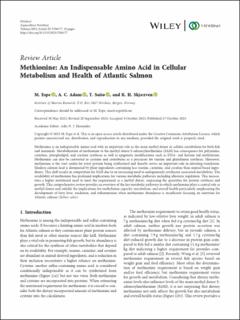Methionine: An Indispensable Amino Acid in Cellular Metabolism and Health of Atlantic Salmon
Peer reviewed, Journal article
Published version
Permanent lenke
https://hdl.handle.net/11250/3106812Utgivelsesdato
2023Metadata
Vis full innførselSamlinger
- Articles [3011]
- Publikasjoner fra CRIStin [3061]
Sammendrag
Methionine is an indispensable amino acid with an important role as the main methyl donor in cellular metabolism for both fish and mammals. Metabolization of methionine to the methyl donor S-adenosylmethionine (SAM) has consequence for polyamine, carnitine, phospholipid, and creatine synthesis as well as epigenetic modifications such as DNA- and histone tail methylation. Methionine can also be converted to cysteine and contributes as a precursor for taurine and glutathione synthesis. Moreover, methionine is the start codon for every protein being synthetized and thereby serves an important role in initiating translation. Modern salmon feed is dominated by plant ingredients containing less taurine, carnitine, and creatine than animal-based ingredients. This shift results in competition for SAM due to an increasing need to endogenously synthesize associated metabolites. The availability of methionine has profound implications for various metabolic pathways including allosteric regulation. This necessitates a higher nutritional need to meet the requirement as a methyl donor, surpassing the quantities for protein synthesis and growth. This comprehensive review provides an overview of the key metabolic pathways in which methionine plays a central role as methyl donor and unfolds the implications for methylation capacity, metabolism, and overall health particularly emphasizing the development of fatty liver, oxidation, and inflammation when methionine abundance is insufficient focusing on nutrition for Atlantic salmon (Salmo salar).
